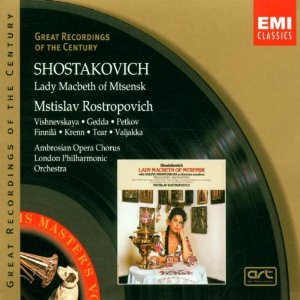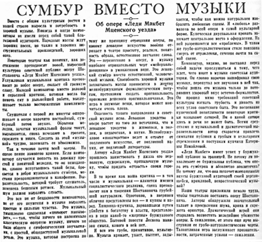Music with Ease > 20th Century Opera > Lady Macbeth of the Mtsensk District (by Dmitry Shostakovich)
Lady Macbeth of the Mtsensk District
(sometimes called: Lady Macbeth of Mtsensk
(by Dmitry Shostakovich)
Opera in 4 acts and 9 scenes.
Composed 1930-2; revised as Katerina Ismailova in 1956-63.
Premiere: Leningrad, 1934.
Libretto: Dmitry Shostakovich and Alexander Prei, after the novel written by Nikolai Leskov in 1865. (Nothing directly to do with Shakespeare's character Lady Macbeth or Verdi's opera, Macbeth.)

Dmitri Shostakovich's Lady Macbeth of Mtsensk, with Mstislav Rostropovich conducting the London Philharmonic Orchestra and with Galina Vishnevskaya in the role of Katerina
Audio CD available from amazon.com
Act 1
Katerina, the frustrated wife of the merchant Zinovy, is bored with life. Boris, her father-in-law, whinges that she has born no heir. While Zinovy is away, a new labourer, Sergey, is employed by Boris. Sergey and other labourers molest the maid, Aksinya. Katerina intervenes and Sergey challenges her to a wrestle. Boris discovers them and threatens to report them to Zinovy. Katerina is in bed when Sergey comes and asks to borrow a book. She replies that she is bored and would like a child. They make love.
Act 2
Boris remembers his wild youth. He happens to catch Sergey leaving Katerina's room and calls his workers to beat Sergey and lock in the store room. Seemingly docile, Katherina serves Boris mushrooms laced with rat poison. Boris dies soon thereafter, but not before denouncing her to a priest for murdering him. The priest pronounces a quick requiem and leaves. Katerina is in bed with Sergey, who tells her that the affair must end when Zinovy returns. Katerina dreams she sees Boris's ghost, who curses her. Zinovy returns and is about to enter the room. Sergey hides. Zinovy accuses his wife of being unfaithful and whips her. Sergey and Katerina kill Zinovy with a candlestick.
Act 3
It is the day of Katerina and Sergey's wedding. A drunken peasant, looking for more alcohol, breaks into the cellar and stumbles across Zinovy's rotting body. He tells the local police who are unhappy at not having been invited to the wedding festivities and are delighted to race off to the wedding to get some free food and drink while investigating the crime. Sergey and Katerina are arrested.
Act 4
Katerina and Sergey are part of a convoy of convicts being marched off to their fate in Siberia. Sergey rejects Katerina, blaming her for their troubles and as he has found a new, younger woman, Sonyetka. The latter demands that Sergey prove his love for her by bringing her Katerina's stockings. Sergey claims he is ill and tricks Katerina into lending over to him. He promptly hands the stockings over to Sonyetka. Sonyetka and the other female convicts taunt Katerina. Katerina sees Sonyetka standing on a bridge and, seeing her chance, pushes the latter into the icy river and jumps in after her. Both drown. The prisoners march off, singing.
A sympathetic portrayal of Lady Macbeth
This opera was originally planned by Shostakovich as the first of a trilogy of operas on the difficulties experienced by women in Russia (the latter two were never written after a savage official attack in Pravda of this first in the series).
Unlike the Lady Macbeth of Leskov's novel who is portrayed as a cruel and heartless murderess, Shostakovich's opera portrays her in more sympathetic terms, showing her capable of affection and sensitivity and depicting her as the victim of her oppressive circumstances and driven to her crime by unending boredom and frustration.

The Pravda newspapera article "Chaos instead of Music" (29 January 1936) that denounced Stravinksy and his opera
Pravda's denunciation of the opera
For two years following its premiere, Lady Macbeth of the Mtsensk District enjoyed great success, with 180 performances in the Soviet Union and more abroad (including at the Met in New York).
Then in December 1935 Josef Stalin, the leader of the Soviet Union, attended a performance and in the following month a long editorial appeared in the official newspaper, Pravda, savagely attacking contemporary Russian performing arts in general and the dissonance and the supposed immorality of Shostakovich's opera in particular.
Headlined "Chaos instead of Music", the editorial thundered:
From the first minute, the listener is shocked by deliberate dissonance, by a confused stream of sound. Snatches of melody, the beginnngs of a musical phrase, are drowned, emerge again, and disappear in a grinding and squealing roar. To follow this "music" is most difficult; to remember it, impossible. (Source: "Chaos instead of music", Victor Seroff translation.)
The editorial was understood to reflect Stalin's opinions. The opera was immediately barred from further performance and it was almost 30 years and ten years after the dictator had died, until it was performed again in the Soviet Union and even then in a bowdlerised form under the title Katerina Ismailova. This toned-down version deleted the lovemaking scene in Act I and lightens up the orchestration and melodies, rendering them less dissonant.
Share this page:
Author: David Paul Wagner
(David Paul Wagner on Google+)
Music With Ease | About Us | Contact Us | Privacy | Sitemap | Copyright | Terms of Use © 2005-25 musicwithease.com. All Rights Reserved. |
